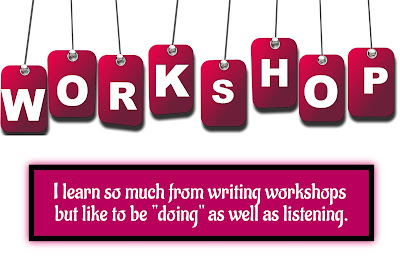Writing Workshops by Allison Symes
Image Credit: Images created in Book Brush using Pixabay photos.
I love writing workshops. I’ve learned so much from them and now I’m running my own (flash fiction, the ups and downs of being a writer etc). I like workshops which give me plenty to think about and exercises I can polish up at home. I want to be “doing” as well as listening. Knowing what I like has helped me tailor my workshops.
I think good old-fashioned pen and paper still has a valuable role to play. This shows up best at a writing workshop. No worries about whether your PC battery will die halfway through the workshop. No worries about whether there will be enough charging points for said PC to avoid that. You just pick up a pen and jot down points of interest.Okay, there is a dilemma to be faced with pen and paper. Just which notebook will I use? Which pen to go with it? Is there any writer who doesn’t have a surfeit of notebooks and pens? When I worked in Winchester many moons ago, I avoided going past Paperchase. You have to know your triggers, right? My bank account was grateful I knew mine!I also learned a while ago there is no such thing as a stupid question at a workshop. Whatever you think of to ask your tutor, someone else in that workshop is likely to be wondering about the same point.I occasionally read out a flash story and break down how I wrote it. I also encourage those coming to my workshops to read out a piece they’ve created during the session. The lovely thing with this is the story doesn’t have to be perfect. Everyone knows this is a first draft. Nobody is going to judge you.
They will simply be interested to listen to what you came up with in the time available. Shakespeare didn’t write a perfect first draft. Neither did Dickens. Guess what? Neither will we! On realizing this for myself, it gave me confidence to share the results of writing exercises I was set by someone else.Once one person shares something of what they’ve written, others will join in. Often you can then get useful discussions going and that’s when the workshop really does become interactive. I’ve not been to a workshop yet where I haven’t learned something useful, (even if it is some time later before I use the information), and I usually learn more than expected from when discussions take off.
The last year or so has been strange. Zoom has been a lifeline. I’ve liked the use of it for workshops and, ironically, that has led to me being asked to do more, including in person events. All to the good!
My next dilemma is to work out which notebook and pen I’ll be taking to workshops I’m going to at a renowned residential writing school in August. I have seven weeks to work this out. I should just about manage that!





Comments
I've never seen the point about being negative about other people's work. Some of it I will love; some of it simply won't be for me and that's all fine. But to be so damning... it's a pity the tutor didn't ask them to read their work out directly after yours! Most writers don't judge others - we all need support.